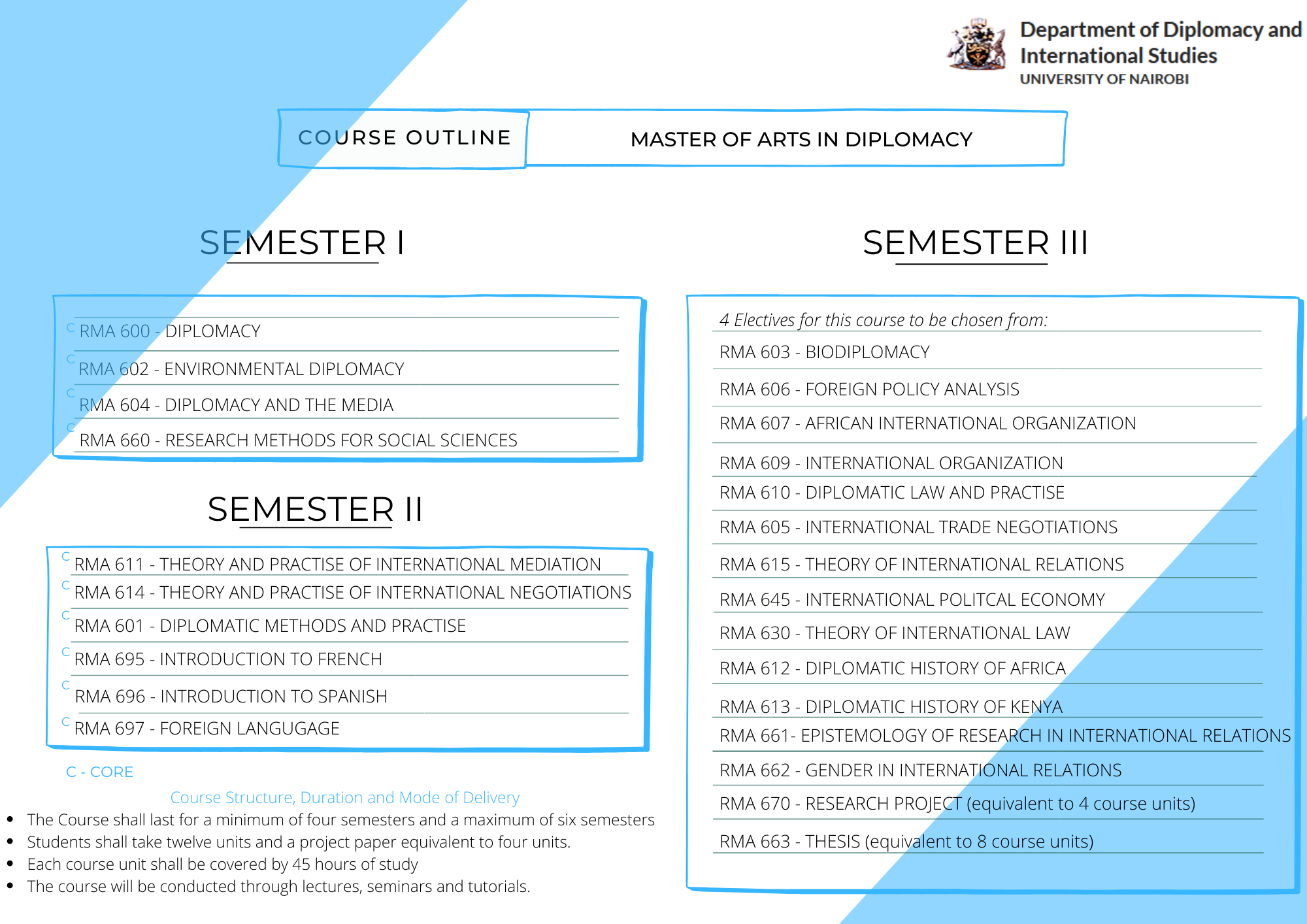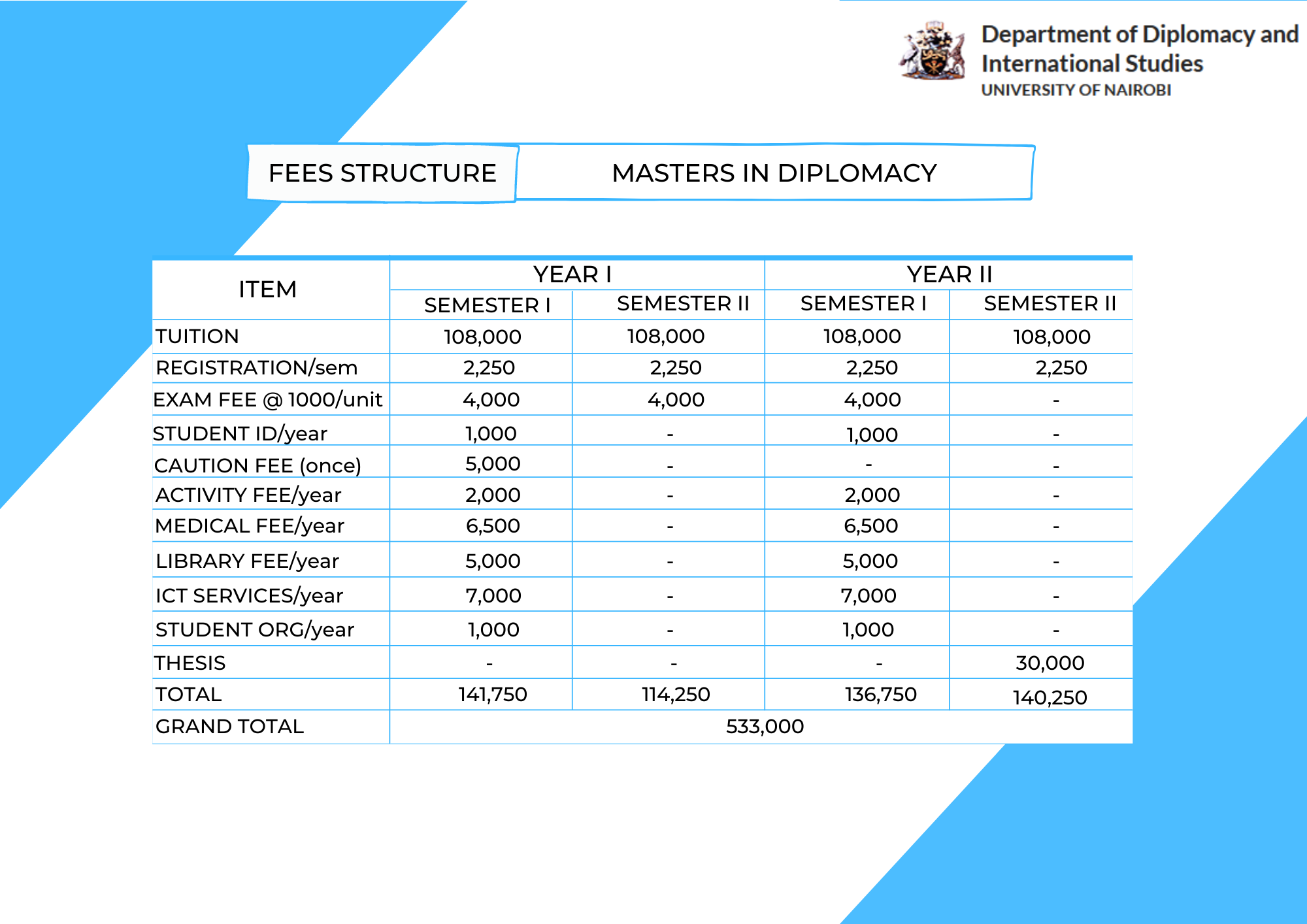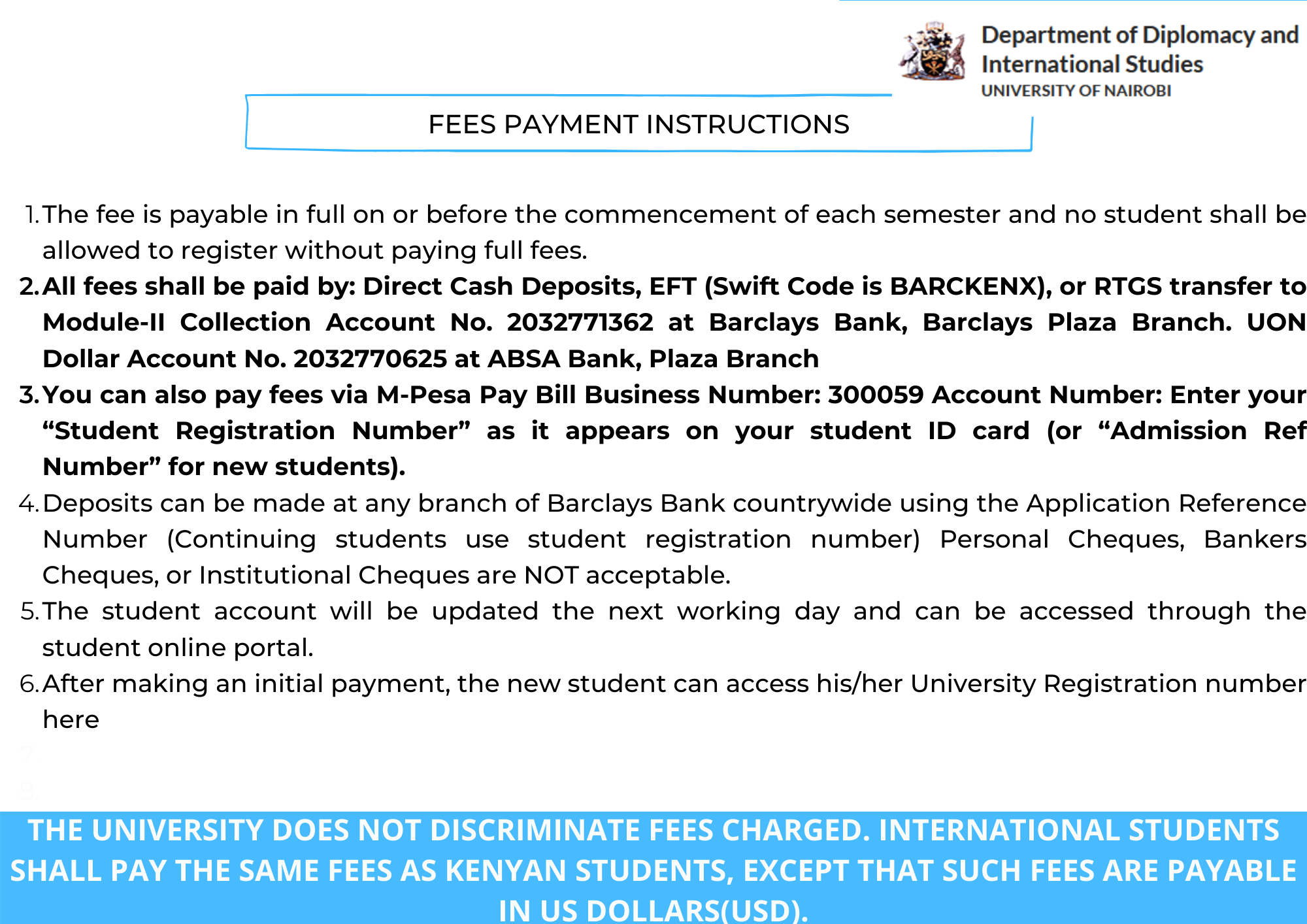Overview
- PHILOSOPHY
The philosophy of this programme is hinged on the belief that in order to secure the world, attain peace, development and human rights, there is need to understand, explain and analyse the dynamics and diplomatic skills necessary for global human interactions as well as the actors and the environment in which these interactions occur. This programme is thus premised on the need to search and obtain new and accurate knowledge that can help society find answers to past and present international issues, events and processes in the fields of governance, politics, security, economy, society, culture and environment.
- RATIONALE
The rationale for this programme is to ensure a comprehensive scope and in-depth analysis regarding international issues related to diplomatic engagement. The programme is also designed to produce highly knowledgeable diplomacy scholars; technocrats and policymakers.
3.1 COURSE OBJECTIVES
The Master of Arts in Diplomacy will:
3.1.1 Expose students to the overall framework of international diplomacy
3.1.2 Acquaint students with the key issues and approaches in diplomacy
3.1.3Acquaint students with new developments in diplomacy
4.0 MODE OF DELIVERY
This programme shall use a blended learning approach of delivery of the programme involving both face to face mode and Open, Distance and E-Learning (ODel) Mode.
4.1. Face to Face The methods of instruction shall be interactive and shall consist of lectures, class presentations, seminars, tutorials, case studies, fieldwork, practical sessions, student-teacher consultations, supervised independent study, group projects, guest speakers, or any combination of these.
4.2. Distance and E-Learning (ODeL) The Open, Distance and e-Learning Programme will include;
a. Multi-media approaches in distance education.
b. E-learning materials which will be provided on the online LMS for synchronous learning and will also be made available in external storage devices as back-up for asynchronous learning.
c. E-learning platform after conversion into e-format to provide collaborative learning through student-student, student-instructor and evaluation interaction.
d. A robust Learner Management System (LMS) and other e-learning Applications (Apps) downloadable on various electronic devices.
e. Limited face-to-face tuition during residential sessions.
f. Learner support services including academic and technical support shall be provided using multi-media approaches and during the limited face-to-face sessions.
Structure

Admission Requirements
2.0 Entry Requirements
The common regulations of the Masters’ Degree at the University of Nairobi shall apply.
The entry requirements for the Master of Arts in International Relations shall be:
Holders of a first degree of at least Second Class Honours Upper Division.
Holders of a degree of Second Class Honours Lower Division with two years working experience.
Holders of a first degree (pass) with a Post-Graduate Diploma from institutions recognized by the Senate.
3.0. Credit Transfer and Exemptions
3.1. No candidate shall be allowed to transfer more than one-third of the total number of taught courses.
3.2 No candidate shall transfer credits for research methodology and the project paper.
3.3 The point of entry into the programme for candidates shall be approved by Senate on the recommendation of the Department of Diplomacy and International Studies Board and shall be based on the qualification of the candidate.
3.4 A candidate seeking exemption shall apply through the Chair, Department of Diplomacy and International Studies, to the Director of the Board of Postgraduate Studies, indicating the course units and supported by relevant documents. Such a candidate may be required to sit and pass an examination in that course unit.
3.4. Applications for exemption shall be considered only after an applicant has paid an exemption fee.
Intake is done in September only.
APPLICATION INFORMATION
To apply for the course you are interested in visit this link below for more information.
https://application.uonbi.ac.ke/
or
Contact support person
Dr. Maluki Chair DDIS - Email. director-idis@uonbi.ac.ke
Careers
CAREER OPPORTUNITIES
Studying Diplomacy at the Department of Diplomacy and International Studies will prepare students for careers in various fields that include:
- Foreign service
- Diplomatic missions
- International Organizations e.g. United Nations, African Union, East African Community, World Bank etc.
- International Non-Governmental Organizations e.g. Human rights Watch, Amnesty International
- Government Security agencies
- International Humanitarian agencies e.g. International committee of the Red Cross.
- Educational Institutions: University teach and research
- Private sector: International Business.
INTERNSHIP OPPORTUNITIES:
Apart from using the university career office, our experienced academics staff will advise and guide our students on how to expose themselves by developing applicable skills and once the student identifies an internship opportunity, the Chair DDIS will provide a recommendation letter.
Fees and Funding


Exam Regulations
6.0. Examination Regulations
6.1. The examinations shall be governed by the examination regulations of the University of Nairobi
6.2. For the Master of Arts Degree in International Studies, a candidate will be required to pass in all the prescribed units taken.
6.3. Each course unit shall be examined by a three-hour written examination at the end of each semester
6.4. The written examinations shall constitute 70% of the marks in each course unit, while the course work shall constitute 30%
6.5. Course work assessment shall comprise or continuous assessment tests per unit.
6.6. The pass mark shall be 50%
6.7. A candidate who fails to satisfy the examiners in any unit shall sit a supplementary examination three months after the examinations
6.8. A candidate may sit for supplementary examinations for a maximum of two times.
6.9 A candidate who fails a supplementary examination twice shall on the recommendation of the Institute Board and approval by Senate be allowed to repeat the course unit.
6.11. Any supplementary examination shall be marked out of 100% but the pass mark shall be 50%.
6.12 A candidate who fails in a repeat shall be discontinued
Examination Regulations for the Project paper:
For the purposes of grading and examination regulations, the research project will be considered to be equivalent to two-semester units
Students will carry out the research project in the area of their specialization.
Students will be allowed to embark on the research project once they have passed all coursework
The research shall be submitted for examination on the recommendation of the supervisor.
The research paper shall be marked out of 100% with 50% as the pass mark
A candidate who fails in the research project shall be allowed to revise it and re-submit it for examination within three months.
A candidate who fails in the resubmission of the project shall on the recommendation of the Department Board and approval by Senate be discontinued.
A candidate who has successfully completed 12 core and 2 units of equivalent research project within the prescribed period shall be awarded a Postgraduate Diploma in International Relations.
7.0 Award of Degree
A candidate who satisfies the examiners in all the examinations shall on the recommendation of the Board of Examiners and approval of Senate be awarded the Degree of Master of Arts in International Studies.
